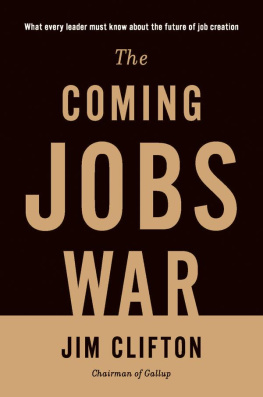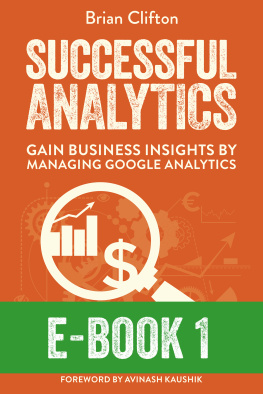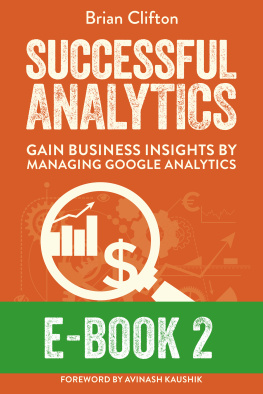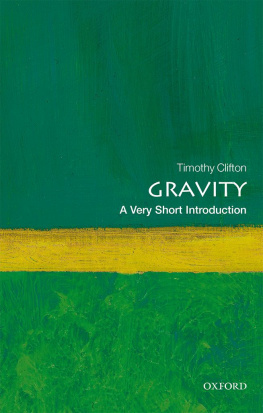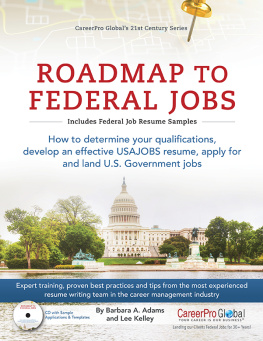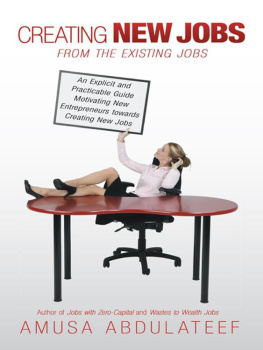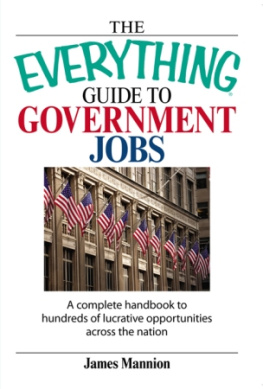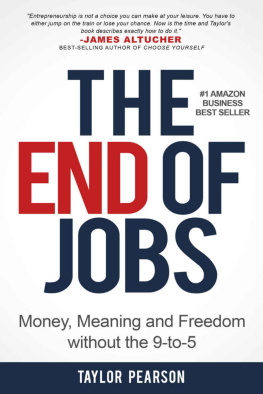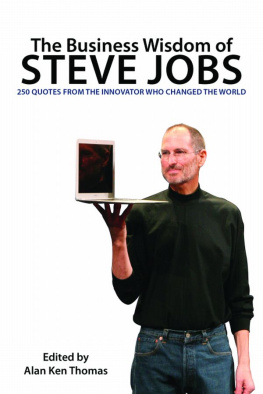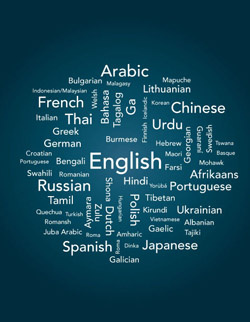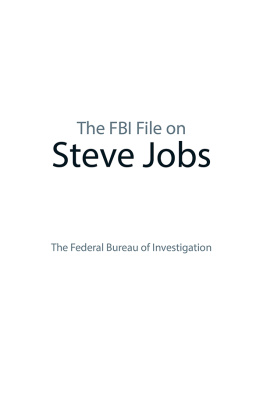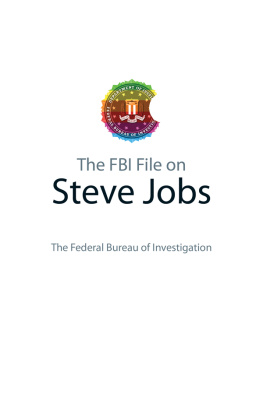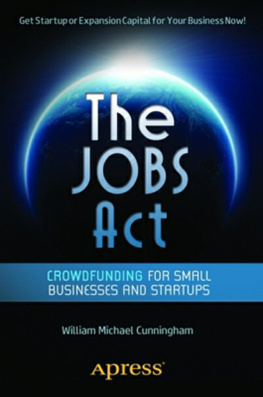Title The Coming Jobs War by Jim Clifton
Copyright GALLUP PRESS
1251 Avenue of the Americas
23 rd Floor
New York, NY 10020 Library of Congress Control Number: 2011930933
ISBN: 978-1-59562-060-6 First Printing: 2011
10 9 8 7 6 5 4 3 2 1 Copyright 2011 Gallup, Inc.
All rights reserved, including the right of reproduction in whole or in part in any form. Gallup, CE, Gallup-Healthways Well-Being Index, Gallup Management Journal, Gallup Press, GMJ, Q, The Gallup Path, and The Gallup Poll are trademarks of Gallup, Inc. All other trademarks are property of their respective owners. The Q items are protected by copyright of Gallup, Inc., 1993-1998. All rights reserved. The CE items are protected by copyright of Gallup, Inc., 1994-2000. All rights reserved.
Dedication To the girl at United Gate F4
Introduction Introduction
The coming world war is an all-out global war for good jobs. As of 2008, the war for good jobs has trumped all other leadership activities because its been the cause and the effect of everything else that countries have experienced. This will become even more real in the future as global competition intensifies. If countries fail at creating jobs, their societies will fall apart. Countries, and more specifically cities, will experience suffering, instability, chaos, and eventually revolution. This is the new world that leaders will confront. If you were to ask me, from all the world polling Gallup has done for more than 75 years, what would fix the world what would suddenly create worldwide peace, global wellbeing, and the next extraordinary advancements in human development, I would say the immediate appearance of 1.8 billion jobs formal jobs. Nothing would change the current state of humankind more. The leadership problem is that an increasing number of people in the world are miserable, hopeless, suffering, and becoming dangerously unhappy because they dont have an almighty good job and in most cases, no hope of getting one. A good job is a job with a paycheck from an employer and steady work that averages 30+ hours per week. Global labor economists refer to these as formal jobs. Sometimes leaders and economists blur the line between good jobs (formal jobs) and informal jobs. Informal jobs are jobs with no paycheck, no steady work. Theyre found in, but not limited to, developing countries and include basic survival activities such as trading a chicken for coal. These jobs do create subsistence and survival, but not real economic energy. They are held by people who are not only miserable but, according to Gallup, suffering their way through life with no hope for a formal job no hope for a good job. Of the 7 billion people on Earth, there are 5 billion adults aged 15 and older. Of these 5 billion, 3 billion tell Gallup they work or want to work. Most of these people need a full-time formal job. The problem is that there are currently only 1.2 billion full-time, formal jobs in the world. This is a potentially devastating global shortfall of about 1.8 billion good jobs. It means that global unemployment for those seeking a formal good job with a paycheck and 30+ hours of steady work approaches a staggering 50%, with another 10% wanting part-time work. This also means that potential societal stress and instability lies within 1.8 billion nearly a quarter of the worlds population. Its against this backdrop that the coming jobs war will be fought. Whats more, the big discovery that guides this book is that this new world war for good jobs will trump everything else. Thats because the lack of good jobs will become the root cause of almost all world problems that America and other countries will attempt to deal with through humanitarian aid, military force, and politics. The lack of good jobs will become the cause of hunger, extremism, out-of-control migration patterns, reckless environmental trends, widening trade imbalances, and on and on. My big conclusion from reviewing Gallups polling on what the world is thinking on pretty much everything is that the next 30 years wont be led by U.S. political or military force. Instead, the world will be led with economic force a force that is primarily driven by job creation and quality GDP growth. If there was a U.S. Department of Job Creation and it was successful, its results would overwhelm the success of the U.S. Department of State or the Department of Defense. Political and military forces would no longer determine world outcomes. The demands of leadership have changed. The highest levels of leadership require mastery of a new task: job creation. Traditional leadership through politics, military force, religion, or personal values wont work in the future like it has in the past. The nuances of personal values will be anchored in how they affect almighty jobs more than in Almighty God or anything else. Human rights, stem cell research, gay rights, women in the global workplace what will matter about these issues will be how they affect job growth more than how they affect family, political, and religious values. Let me be as specific as possible in describing this new war. As of 2010, the world has a total gross domestic product (GDP) or the sum of countries total goods and services for one year of $60 trillion. Of this, the United States has nearly $15 trillion or about 25%, which is huge. Over the next 30 years, the global GDP will grow to an estimated $200 trillion. So a new $140 trillion of customers, employees, new businesses, and equity will come into the global mix. The global war for jobs will be an all-out battle for that $140 trillion because within that sum of money is the next evolution of the best jobs in the world. Within that $140 trillion will rise the next economic empires, as well as the potential for societal hell. World War II was a stunning military success that saved the world. Losing World War II would have ended America as the world knew it, not to mention much of the democratic Western world. It was a war for Americas very freedom, for the Wests freedom, for leadership of the free world. It was a war for all the marbles. Everything was on the line, and a loss would have changed everything. The war for global jobs is like World War II: a war for all the marbles. The global war for jobs determines the leader of the free world. If the United States allows China or any country or region to out-enterprise it, out-job-create it, out-grow its GDP, everything changes. This is Americas next war for everything.
Chapter One What 7 Billion People Want More and more often, global leaders ask Gallup the same simple, yet colossal, question: Does anyone know for sure what the whole world is thinking? Traditional economic data record an infinite amount of human transactions, from GDP to employment to everything everyone bought throughout their lives to birth and death rates. These data go to great lengths to indicate what man and woman are doing, but there is no ongoing, infinite, systematic account of what man and woman are thinking . Global leaders are right to wonder. Every issue that keeps them up at night, such as poverty, war, the environment, unemployment/job creation, and extremism/terrorism, hinges on their constituencies state of mind. What people think about whether its the economy, the Middle East, energy sources, or the environment affects their behavior. If leaders knew what the whole world was thinking not just their own people on almost all issues all the time, at the very least, their jobs would be a lot easier. At most, knowing what the world was thinking would make the work they do more effective. Leaders wouldnt make mistakes and miss opportunities because they misjudged the hearts and minds of their constituencies and the rest of the 7 billion with whom those constituencies interact. It is precisely to make global leaders more effective why we at Gallup created a new body of behavioral economic data that represents the opinions of the worlds 7 billion inhabitants across nearly every country and demographic and sociographic group imaginable. We call it the World Poll. We started it in 2005 and are committed to doing it for 100 years. We knew going in that creating the World Poll was a monumental challenge, but it was even harder than we thought. To start, our scientists conducted stakeholder interviews with hundreds of world leaders and academics and combed through data from the best public opinion archives, universities, the United Nations, the World Bank, the European Union archives, the U.S. State Department everything and everywhere they thought they might find existing information of this type. What our scientists needed was a massively comprehensive poll of the world, and they couldnt find anything like it. So we made one. The poll needed to cover almost every issue in the world, be translated accurately into hundreds of languages, and be meaningful in every culture. Even more difficult was engineering consistent sampling frames in more than 150 countries from Ecuador to Rwanda to Iran to Russia, Afghanistan, Ireland, Cuba, Lebanon, Kazakhstan, Venezuela, Honduras, China you get the picture. Having constructed the questionnaire, our experts found that their next biggest challenge was choosing a methodology that ensured consistent data collection to make the whole data set comparable. For instance, when we ask about life satisfaction, everyone from a Manhattan socialite to a Masai mother has to be asked the same question every time in the same way with the same meaning and in their own language so the answers are statistically comparable. We knew that it was critical to make the meaning of each question identical from language to language, culture to culture, year to year. Furthermore, we needed to create reliable and consistent standards across the board so that leaders could see the trends and patterns. So we benchmarked wellbeing, war and peace, law and order, hopes and dreams, health and healthcare, suffering and thriving, personal economics, poverty, environmental issues, workplaces, and on and on. Then our scientists and affiliated academics and colleagues from around the world who helped us make the poll got really busy. They counted and sorted and used every statistical technique known to man to analyze exactly what the world is thinking. The conclusions are complex. This may be the greatest understatement in Gallups history, but its true. These data offer answers to many questions that could never be answered before. They make us intensely aware of how little we know about what is in the hearts and minds of 7 billion people and how often we are wrong about their hopes and dreams, their wills, and their ways of life. As our founder, the late Dr. George Gallup, said back when the world had 5 billion inhabitants, There are 5 billion ways to lead a life, and we should study them all. The Discovery Six years into our global data collection effort, we may have already found the single most searing, clarifying, helpful, world-altering fact. What the whole world wants is a good job. This is one of the most important discoveries Gallup has ever made. At the very least, it needs to be considered in every policy, every law, and every social initiative. All leaders policymakers and lawmakers, presidents and prime ministers, parents, judges, priests, pastors, imams, teachers, managers, and CEOs need to consider it every day in everything they do. That is as simple and as straightforward an explanation of the data as I can give. Whether you and I were walking down the street in Khartoum, Cairo, Berlin, Lima, Los Angeles, Baghdad, or Istanbul, we would discover that the single most dominant thought on most peoples minds is about having a good job. Humans used to desire love, money, food, shelter, safety, peace, and freedom more than anything else. The last 30 years have changed us. Now people want to have a good job, and they want their children to have a good job. This changes everything for world leaders. Everything they do from waging war to building societies will need to be carried out within the new context of the need for a good job. The word good is important. Some job, any job, isnt enough. When people talk about a good job, they mean a job that gives them the amount of work they want. Your cousin may pay you for helping out at his roadside food stand, but thats far from a job in a company thats officially registered with the government and where you have regular work for 30 hours or more a week. The desire for a good job is the current will of the world, and whether or not you have a good job defines your relationship with your city, your country, and the whole world around you. A great question for leaders to ask is: Why is knowing that the whole world wants a good job everything to me? The answer is: Leaders of countries and cities must make creating good jobs their No. 1 mission and primary purpose because good jobs are becoming the new currency for all world leaders. Everything leaders do must include this new global state of mind or theyll put their cities and countries at risk. Lawmakers need to know whether new laws such as taxes, healthcare legislation, and environmental regulations attract or repel talented entrepreneurs. If enough talented people are repelled, then the new laws will cause brain drain and undermine job creation. Public school superintendents and university presidents need to think beyond core curricula and their graduation rates. Students dont want to merely graduate; they want an education that results in a good job. Military leaders must consider good jobs when waging war and planning for peace. They must ask themselves whether military strikes, occupations, or community policing will be followed by a growing economy with good jobs or not. The opportunity to have a good job is essential to changing a populations desperate and violent frame of mind. Mayors and leaders of every city, town, and village on Earth must realize that every decision they make should consider the impact, first and foremost, on good jobs. The evolution of the great global dream is going to be the material for hundreds of Ph.D. dissertations. But its only the beginning of the story. Shifting the importance humans place on peace, love, food, and shelter all the things people used to care about more than anything to a good job suggests a significant change in the evolution of civilization. One of the most important changes is in global migration patterns. Man and woman probably appeared about 200,000 years ago on the savannah plains in what is now Ethiopia. They fanned out to improve their lives, their tribes, and their families. And they have never stopped walking. The first to move have always been the boldest adventurers, explorers, and wanderers, and thats still true. Until rather recently in human evolution, explorers were looking for new hunting grounds, cropland, territories, passageways, and natural resources. But now, the explorers are seeking something else. Todays explorers migrate to the cities that are most likely to maximize innovation and entrepreneurial talents and skill. Wherever the most talented choose to migrate is where the next economic empires will rise. Thats why San Francisco, Seoul, and Singapore have become such colossal engines of job creation. When the talented explorers of the new millennium choose your city, you attain the new Holy Grail of global leadership brain gain, talent gain, and subsequently, job creation. You might notice how often I use America as an example in this book. Thats not an accident. Though this book applies to every economy in the world the science was tested and analyzed from a global perspective for a global purpose America holds a special place in the global economy. Because it has a massive GDP and is a long-standing beacon for entrepreneurs all over the world, America has an economic and moral authority that no other country has. That authority is eroding. Im an American and a patriot. But Im also a realist. As long as the United States maintains its position as a global economic superpower, it also has the strength to advance a pro-democracy, pro-jobs, pro-free-enterprise world. Of the three, the most important is free enterprise because it is now the horse, and everything else is the cart. Over the past 100 years, capitalism has become the very basis of modern human development. Capitalism occurs where free enterprise the freedom to create anything you want, to build whatever you want is allowed to flourish. I wrote this book with the belief that humans prosper and evolve most quickly in a culture, a community, or a nation where free enterprise is the core activity. Simply put, the exchange of goods makes everything else possible. So while I use the United States as an example, I hope that readers from Buenos Aires to Budapest recognize the value that a job-creating U.S. economy holds for them. As a beacon of free enterprise not the only one, certainly, but remaining the most powerful America has a unique responsibility on the world stage. Everyone benefits from its success.

